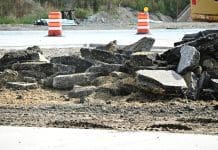Monthly construction output grew by 17.6% in July 2020, following the record monthly growth of 23.5% in June 2020, according to the latest ONS figures
The level of construction output in July 2020 was 11.6% below the February 2020 level.
Construction output fell by 10.6% in the three months to July 2020, compared with the previous three-month period. This decrease was driven by falls in both new work (9.7%) and repair and maintenance (12.4%).
The plummet in new work (9.7%) in the three months to July 2020 was due to falls in every new work sector, apart from infrastructure, which grew by 6.0%.
The largest negative contributor for new work was private new housing, which fell by 17.0%.
The repair and maintenance sector witnessed a 12.4% decrease in the three months to July 2020 – this was attributed to falls in all sectors which was largely impacted by a 17.9% drop in private housing repairs.
‘A long way from being out of the woods’
Commenting on the new construction output figures, Clive Docwra, managing director of McBains, said: “Today’s figures will be welcomed by the construction sector as a sign of its continuing recovery, but in reality they need to be viewed in the context of an industry that experienced a record 40% drop in output at the height of the lockdown.
“Construction is still a long way from being out of the woods and the upturn is extremely fragile, reflected by the fact the figures show that new work decreased by 9.7% in the three months to July 2020, with private new housing work alone falling by 17.0%.
“The big concern for the industry is if there’s a second spike and a further lockdown. The government needs to do all it can to ensure the sector maintains its recovery.
“On top of this, of course, a potential no deal at the end of the Brexit transition period is making investors nervous about committing to new projects.
“The Prime Minister may want the industry to ‘build, build, build’ but that’s difficult when many investors are saying ‘wait, wait, wait’ and holding off embarking on new developments until there’s greater clarity.”














